 In 2011 Bishop Hans van den Hende, bishop of Rotterdam, gave one of the catechesis classes during the World Youth Days in Madrid. His talk then was met with a standing ovation. This year, although he joined pilgrims for the pre-WYD program in Suriname, he returned home before the start of the World Youth Days proper in Rio. But, as the WYD@Home program took place within the bounds of his diocese, in Delft, Msgr. van den Hende did offer catechesis there.
In 2011 Bishop Hans van den Hende, bishop of Rotterdam, gave one of the catechesis classes during the World Youth Days in Madrid. His talk then was met with a standing ovation. This year, although he joined pilgrims for the pre-WYD program in Suriname, he returned home before the start of the World Youth Days proper in Rio. But, as the WYD@Home program took place within the bounds of his diocese, in Delft, Msgr. van den Hende did offer catechesis there.
Here follows my translation of the text, which may be found in Dutch here.
1. Topic of the Catechesis
In unity with Pope Francis and with the youth in Rio we here in Delft also have catechesis. We follow the catechesis program as given in Rio. Catechesis means: putting the contents of our faith into words, explaining and communicating them.
The catechesis here in Delft and in Rio is closely tied into the theme of WYD 2012. Every WYD has its own theme, chosen by the Pope, including this year’s WYD in Rio. The previous Pope, Pope Benedictus XVI, gave the WYD in Rio the following theme: “Go and make disciples of all nations”.
The words of the theme are words from the Bible. They come from the New Testament, from the Gospel of Matthew: “Go, therefore, make disciples of all nations” (Matt. 28:19).
2. The Gospel = the Good News of Jesus Christ
In the Gospels the person of Jesus Christ takes centre stage [1].In the first chapter the Gospel of Matthew explains that God’s salvation history from the Old Testament is linked to the person of Jesus Christ (the so-called genealogy). Jesus is the fulfillment of God’s promise, He is the Messiah (the Anointed One, the Christ). In that way Jesus is at the heart of the Gospel of Matthew.
That is also the case in the other three Gospels. The Gospels tell us who Jesus is: the incarnated Son of God. The Gospel also proclaims the message that Jesus promotes. The Catechism of the Catholic Church states: “The Gospels are the heart of all the Scriptures “because they are our principal source for the life and teaching of the Incarnate Word, our Saviour”.” [2]
As an illustration, three quotes from the Gospels of Mark, Luke and John. These clearly show the intent of the Gospels:
-
The Gospel of Mark’s opening sentence is “The beginning of the gospel about
Jesus Christ, the Son of God” [3].
-
The introduction of the Gospel of Luke states: “I […] have decided to write an ordered account for you, […] so that your Excellency may learn how well founded the teaching is that you have received” [4].
-
Near the end of the Gospel of John we read: “There were many other signs that Jesus worked in the sight of the disciples, but they are not recorded in this book. These are recorded so that you may believe that Jesus is the Christ, the Son of God, and that believing this you may have life through his name” [5].
So the Gospel proclaims to us that Jesus is the Son of God, that the message of Jesus is the Good News of God’s Love, that Jesus gave His life on the cross; He died for us.That the Word of Jesus is trustworthy, that Jesus has risen from the dead; that He lives. In short, the Gospel encourages us to follow Jesus: believe in Him, have trust in Him, build your life on Him: He lives!
3. Jesus lives
To start with, we’ll look at the final part of the Gospel. When Jesus died on the cross, it seemed as if everything was over, had come to a dead end. The Gospel tells us that the dead Jesus was buried [6]. The disciples and other friends of Jesus were truly in mourning. The heavy stone that they had placed before the entrance to Jesus’ grave weighed also, in a sense, heavily upon their hearts.
But the Gospel does not end with the death and burial of Jesus. On the contrary, the Gospel proclaims that Jesus lives. When the disciples visit the grave, it is empty. The Gospel tells us: Jesus is no longer in the grave, He has risen [7].
That is the Good News of Easter: Jesus lives! The Gospels also relate that Jesus visited his disciples several times after His resurrection, that He appeared to them: for example to Mary Magdalen [8], to the Apostles in their home [9], on the shore of the lake [10], on the road [11], and on the mountain (Matt. 28:16-20).
On the mountain Jesus ultimately gave his disciples the special assignment: “Go and make disciples of all nations”. These are the words that are the them of WYD 2013.
Jesus, the Risen Lord, asks his disciples to communicate the Good News to others and to baptise them. In the book Acts we read that the Apostles remain loyal to the assignment to go and make disciples of all nations, which they received from Jesus. The Apostle Pater, for example, holds a speech and proclaims the crucified and risen Jesus Christ to his audience. And Peter subsequently baptises about three thousand people who join them [12].
Jesus lives. He stays with us. In Matthew 28:20b, Jesus promises: “And look, I am with you always; yes, to the end of time”. That is why we – centuries later – stand when the Gospel is read during the celebration of the Eucharist. We have the good habit to stand at the Gospel because we believe that Jesus himself, the living Lord, is speaking in the words of the Gospel [13]. We are called to be listeners to Jesus’ words and also proclaimers and executors of them. As disciples of the Lord we listen to the Word of God to act according to them [14].
 4. To be a disciple of Jesus: learning from Jesus
4. To be a disciple of Jesus: learning from Jesus
Jesus is true teacher. That is also the opinion of the rich young man in the Gospel, who asks Jesus: “Good master, what must I do to inherit eternal life?” [15]. Jesus Christ is a good teacher in the words he speaks and the actions he performs in His life amid the people: what Jesus asks of us, He also does himself.
A) In the first place the words Jesus speaks. We may learn from the words of Jesus. In the first place Jesus makes use of the expressive language of parables. The Gospels tells us: “He told them many things in parables” [16], and: In all this Jesus spoke to the crowds in parables; indeed, he would never speak to them except in parables” [17].
When we are a little bit familiar with the texts of the Gospels, we all know a few parables, for example: of the sower who sows on different kinds of soil: rocky soil, shallow soil, soil with weeds and thistles, good fertile soil [18]. The Catechisms states that parable are mirrors for man: “will he be hard soil or good earth for the word?” [19]
In the Gospel we can also read that Jesus speaks His words as a teacher in conversations with people, for example with the scribe Nicodemus. The Pharisee Nicodemus comes to Jesus at night to converse with Him and he says to Jesus, “Rabbi, we know that you have come from God as a teacher; for no one could perform the signs that you do unless God were with him” [20]. Another example is Jesus’ conversation with Mary, the sister of the deceased Lazarus. Jesus tells her, “I am the resurrection. Anyone who believes in me, even though that person dies, will live, and whoever lives and believes in me will never die. Do you believe this?” [21] As disciples of the Lord we can do no else but start listening attentively to Jesus’ words in the Gospel [22].
B) We can also learn from the things that Jesus does in the Gospel, of the actions that Jesus performs. As disciples we may carefully read and see the acts of the Lord, learn from them and imitate them.
-
Jesus is faithful in praying to His Father. The Catechisms tells us: “When Jesus prays he is already teaching us how to pray” [23]. In the Gospels we read that when Jesus prays to His Father, the disciples at one point asks Jesus, “Lord, teach us to pray” [24].
-
Jesus also performed acts of love and charity and so encourages His disciples to truly love their neighbours. Jesus says, “in so far as you did this to one of the least of these brothers of mine, you did it to me” [25]. And in the Gospel of John, Jesus says, “This is my commandment: love one another, as I have loved you” [26].
-
Very impressive is the footwashing that Jesus performs at the Last Supper. The washing of feet was, at that time, the work of a servant, but Jesus does it himself and says, “If I, then, the Lord and Master, have washed your feet, you must wash each other’s feet. I have given you an example so that you may copy what I have done to you” [27].
-
Jesus is a true teacher when it comes to forgiveness and mercy. In the home of the Pharisee Jesus expressly forgives a women who is known to be a sinner, but who is penitent [28]. To an adulterous woman who is about to be stoned for her sin, Jesus says, “Go away, and from this moment sin no more” [29]. And to the taks collector Zacchaeus in Jericho, Jesus says, “I am to stay at your house today” [30]. In the end, when He is dying on the cross after taunts and torture, Jesus prays, “Father, forgive them; they do not know what they are doing” [31]. That is why the Catechism of the Catholic Church states, “The Gospel is the revelation in Jesus Christ of God’s mercy to sinners” [32].
Do we, as disciples, really want to listen to Jesus’ words, keep them in our hearts, and put them into practice? That is only possible if we really want to learn from Jesus, from His words and His actions. As a disciple of Jesus you let yourself be touched by His words and actions. It is necessary to let yourself be formed in your life by Jesus [33]. Because Jesus rose from the dead and lives, He can now be our teacher, shepherd and friend, in the community of the Church.
5. Trusting in Jesus: believing in Jesus
Jesus Christ, the living Lord, asks us, as His disciples, to really trust in Him. This means:
-
Believing that Jesus lives (Jesus is not just someone from the past, He is also close to us now);
-
Believing that Jesus loves you and is interested in you, that He calls you with your talents;
-
Being willing to entrust your life to the Lord by being honest to yourself and to God, asking and receiving forgiveness for your sins (Sacrament of Confession), laying your fears at His feet (Jesus also knew fear [34]);
-
Offering your talents to Him: the willingness to be an instrument of God;
-
Believing that Jesus has given you the Church to learn, to celebrate, to serve and live in faith and love in the community of faith.
It is important to realise that the word of God, the Gospel, is also the word of the Church. Jesus has entrusted His Good News to us, His Church: to write down, to life from, to communicate [35].
6. Following Jesus: building your life upon Christ
As a disciple of Jesus you are invited to build your life upon Jesus. To be able to do and grow in that the following points or of vital importance:
-
Your life with Jesus needs a continuous conversation with Christ in prayer, alone in your inner room [36] and in the community of the Church;
-
Your relationship with Jesus, the living Lord, has consequences for how you relate to people around you (concerning honesty, neighbourly love, forgiveness, pure intentions, etc);
-
Every day requires conversion (if necessary forgiveness of sins in the Sacrament of Penance and Reconciliation: confession);
-
Your life in faith is never without difficulties (it is necessary to be willing to give something for it, the sign of the cross means victory but also presupposes suffering and sacrifice [37]);
-
Life in faith can never exist by our own strength alone: it is a gift from God, of God’s mercy: it is therefore necessary to keep celebrating the sacraments, to ask and receive the comfort and wisdom of the Holy Spirit, to accept and experience the support of your guardian angel [38];
-
Your life in faith needs good examples: look towards the saints as friends of God. They are our intercessors, which means that they pray with you to God.
In short: your path as a disciple of Jesus is a lifelong journey with Jesus Christ in the power of the Holy Spirit, in the community of the Church, from day to day, with ups and downs.
7. In closing (through Him and with Him and in Him)
The first word of the theme of the WYD is “go”. That means getting up towards your neighbour to confess your faith in Jesus. You can only do so if you’ve first come to Jesus, meaning:
-
Consciously aligning your heart with the Lord and letting Him touch you
-
Actively uniting your life to the Lord and His Church
-
Choosing to place your life in the light of the Gospel
Only when you’ve come to Jesus yourself, only then you can leave from Jesus and go in His name to win others for the Lord, to make others into disciples of Christ.
8. Questions to discuss
-
Do you believe that Jesus lives? What does that mean for you personally?
-
What would you like to learn from Jesus?
-
What do you think is the most important thing to tell others about Jesus?
+ J. van den Hende
Bishop of Rotterdam
Photo credit: P. van Mulken
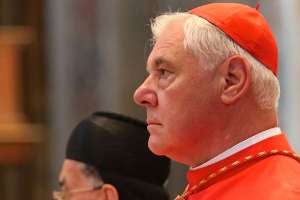 On Friday, Cardinal Gerhard Müller, former prefect of the Congregation for the Doctrine of the Faith and now a sort of free-roaming cardinal with no specific mission, issued a “Manifesto of Faith“. As he explains in the opening paragraphs he did so on the request of various people, both clergy and laity, in order to provide some measure of clarity to the confusion that exists about Catholic doctrine. Without doubt, we must understand this to be based in the different interpretations of recent papal teachings regarding such varied topics like marriage, sexuality and ecumenism. The teachings themselves may not be confusing, but their communication and interpretation most definitely are. But Cardinal Müller’s reasons go beyond this, and back over past decades and the formation, or lack thereof, of the faithful on matters of conscience, the nature of Christ, the Church, the sacraments, morality and eternal life.
On Friday, Cardinal Gerhard Müller, former prefect of the Congregation for the Doctrine of the Faith and now a sort of free-roaming cardinal with no specific mission, issued a “Manifesto of Faith“. As he explains in the opening paragraphs he did so on the request of various people, both clergy and laity, in order to provide some measure of clarity to the confusion that exists about Catholic doctrine. Without doubt, we must understand this to be based in the different interpretations of recent papal teachings regarding such varied topics like marriage, sexuality and ecumenism. The teachings themselves may not be confusing, but their communication and interpretation most definitely are. But Cardinal Müller’s reasons go beyond this, and back over past decades and the formation, or lack thereof, of the faithful on matters of conscience, the nature of Christ, the Church, the sacraments, morality and eternal life.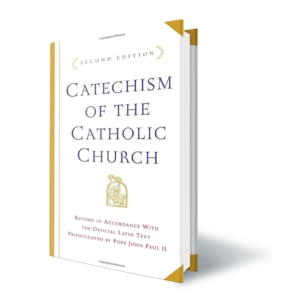 The manifesto is in the first place a summary of the Catechism of the Catholic Church, at least regarding the topics discussed. It is stuffed with references to paragraphs from the document, which aims to summarise the faith, and as such can serve as a helpful reminder of what it is that we confess as Catholics and how that affects our spiritual and daily life. Cardinal Müller also offers a few interpretations and explanations, which are all the interpretations of Tradition, communicated over the years and centuries by popes and theologians alike. Until those interpretations, for example that divorced and civilly remarried faithful can not receive Communion, are changed, they stand. They are what we are beholden to as Catholics. And, despite footnotes and desires expressed in interviews, under Pope Francis no steps have yet been taken to change this.
The manifesto is in the first place a summary of the Catechism of the Catholic Church, at least regarding the topics discussed. It is stuffed with references to paragraphs from the document, which aims to summarise the faith, and as such can serve as a helpful reminder of what it is that we confess as Catholics and how that affects our spiritual and daily life. Cardinal Müller also offers a few interpretations and explanations, which are all the interpretations of Tradition, communicated over the years and centuries by popes and theologians alike. Until those interpretations, for example that divorced and civilly remarried faithful can not receive Communion, are changed, they stand. They are what we are beholden to as Catholics. And, despite footnotes and desires expressed in interviews, under Pope Francis no steps have yet been taken to change this. Sister Helen Prejean, renowned American anti-death penalty advocate,
Sister Helen Prejean, renowned American anti-death penalty advocate,  The most extensive comment, although one without directly addressing the cardinal, comes from Bishop Gerard de Korte of ‘s-Hertogenbosch. In his
The most extensive comment, although one without directly addressing the cardinal, comes from Bishop Gerard de Korte of ‘s-Hertogenbosch. In his 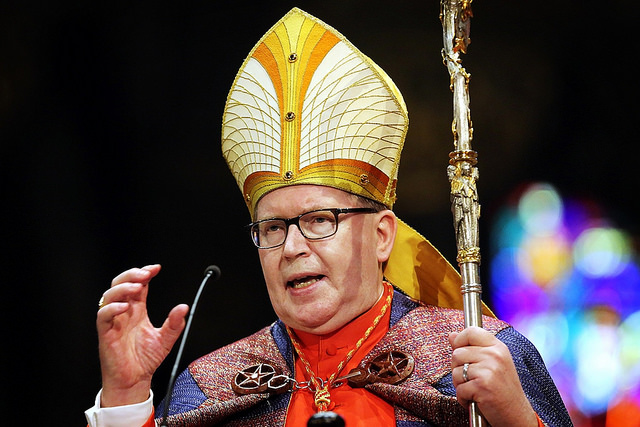

 Bishop Franz-Josef Bode of Osnabrück has been making some minor headlines with his comments about opening up the reception of the sacrament of Holy Communion to non-Catholic spouses of Catholic faithful. In
Bishop Franz-Josef Bode of Osnabrück has been making some minor headlines with his comments about opening up the reception of the sacrament of Holy Communion to non-Catholic spouses of Catholic faithful. In  Pope Francis is making headlines again, once more following an in-flight press conference on his return from a papal visit abroad, in this case to Armenia. The headlines generally follow one format: “Pope asks forgiveness from gays” or some variation thereof. While this is essentialy correct, the Holy Father’s complete answer is more nuanced and different from what more than a few readers will conclude from the headlines.
Pope Francis is making headlines again, once more following an in-flight press conference on his return from a papal visit abroad, in this case to Armenia. The headlines generally follow one format: “Pope asks forgiveness from gays” or some variation thereof. While this is essentialy correct, the Holy Father’s complete answer is more nuanced and different from what more than a few readers will conclude from the headlines.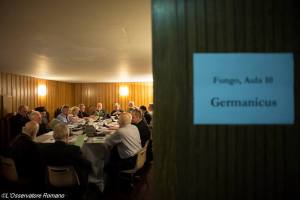 “We have extensively discussed the concepts of mercy and truth, grace and justice, which are constantly treated as being in opposition to one another, and their theological relationships. In God they are certainly not in opposition: as God is love, justice and mercy come together in Him. The mercy of God is the fundamental truth of revelation, which is not opposed to other truths of revelation. It rather reveals to us the deepest reason, as it tells us why God empties Himself in His Son and why Jesus Christ remains present in His Church through His word and His sacraments. The mercy of God reveals to us in this way the reason and the entire purpose of the work of salvation. The justice of God is His mercy, with which He justifies us.
“We have extensively discussed the concepts of mercy and truth, grace and justice, which are constantly treated as being in opposition to one another, and their theological relationships. In God they are certainly not in opposition: as God is love, justice and mercy come together in Him. The mercy of God is the fundamental truth of revelation, which is not opposed to other truths of revelation. It rather reveals to us the deepest reason, as it tells us why God empties Himself in His Son and why Jesus Christ remains present in His Church through His word and His sacraments. The mercy of God reveals to us in this way the reason and the entire purpose of the work of salvation. The justice of God is His mercy, with which He justifies us.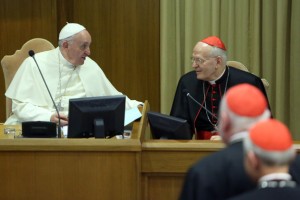 The
The  In 2011 Bishop Hans van den Hende, bishop of Rotterdam, gave one of the catechesis classes during the World Youth Days in Madrid.
In 2011 Bishop Hans van den Hende, bishop of Rotterdam, gave one of the catechesis classes during the World Youth Days in Madrid.  4. To be a disciple of Jesus: learning from Jesus
4. To be a disciple of Jesus: learning from Jesus Pope Francis’ recent homily about salvation, and even more so Father Thomas Rosica’s comments about it, has led to much speculation, confusion and even anger about one of the most essential questions in the faith: the question of who goes to Heaven and who goes to Hell. Maybe it’s good to shine a small light on this difficult theological topic.
Pope Francis’ recent homily about salvation, and even more so Father Thomas Rosica’s comments about it, has led to much speculation, confusion and even anger about one of the most essential questions in the faith: the question of who goes to Heaven and who goes to Hell. Maybe it’s good to shine a small light on this difficult theological topic. Christ’s sacrifice on the Cross, by which He brought about redemption for humanity, was not in any way limited. It’s target audience, so to speak, included every human being in past, present and future. But in order to properly understand this, we must try and understand how redemption works.
Christ’s sacrifice on the Cross, by which He brought about redemption for humanity, was not in any way limited. It’s target audience, so to speak, included every human being in past, present and future. But in order to properly understand this, we must try and understand how redemption works. Father Thomas Rosica, who is not the press chief of the Vatican as some media would have it, offers
Father Thomas Rosica, who is not the press chief of the Vatican as some media would have it, offers